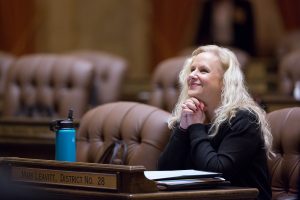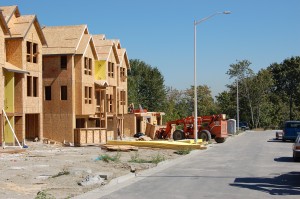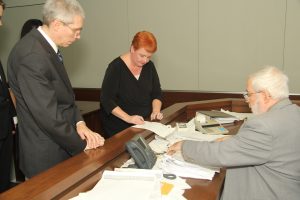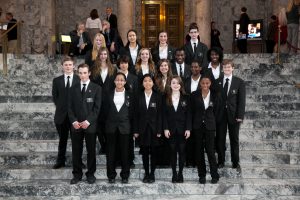Dear neighbors,
The 2020 Legislative Session has officially started and I’m hitting the ground running on a long list of priorities. In this message, I want to share some of the bills I am working on in the areas of housing and homelessness and removing regulations and burdens our military service members, veterans, and their family members face.
Also, last year I introduced HB 1826 to provide more information and transparency regarding the discharge process at Western State Hospital. Unfortunately, we ran out of time to get that bill passed in the Senate in 2019. My colleagues thought the bill was worth trying again and it was one of the first bills we passed out of the House this week. I am hopeful this becomes law this time around.
I will be sharing more messages in the coming weeks about other priorities, including health care and behavioral health, K-12 education and community and technical education (CTE), public safety, children, senior citizens, and workers. It is a short session this year and there’s a lot to get done, so stay tuned!
Addressing homelessness in our schools and our communities
Addressing all aspects of our housing and homelessness crisis is an important priority for me this year. One way we can address two problems, housing affordability and recruitment and retention of our community and technical college faculty, is through a new bill I sponsored this year. HB 2382 simply gives the option for our community and technical colleges to establish and operate faculty and employee housing, just like they do for students. It won’t necessarily require big, expensive new buildings—they can use existing options available to them, such as unused dormitory space or leasing commercially owned space—but it will help our CTCs be more competitive as they hire and retain qualified faculty and employees.
Children and family homelessness can mean more than just sleeping on the streets. Those that couch surf, sleeping on the floors or couches of friends or family without anywhere else to go, are also homeless. But that is not currently recognized for some of the purposes allowed under the Temporary Assistance for Needy Families (TANF) program. I have co-sponsored legislation to add other forms of homelessness into the definition, allowing more families experiencing homelessness to qualify for a hardship extension and be eligible for Housing and Essential Needs (HEN) program.
Over the summer and fall, I collaborated with fellow lawmakers and housing advocates to look beyond shelters and low-income housing to what is next for families who don’t necessarily have housing insecurity, but can’t find the housing they need due to there simply not being much on the market. Having the emergency option of a shelter is great but we need to also have transitional housing, affordable housing and beyond. I’m working with other representatives on a bill to ensure incentives exist are there for developers to build a variety of housing, so that when a family is ready to move into a new apartment, or buy a new home, there is something available to them.
There are some bills returning from last year that I hope can become law this year. One is HB 1263, which changes existing grants to help assist school districts with students experiencing homelessness. Too many children are on the streets and struggling to stay in school and we can do more to help them and their families get into stable housing.
Finally, last year I voted to expand relocation assistance for manufactured and mobile home park tenants. Many people will find stable housing at these types of properties, but when they need to relocate due to a park closing, it can be very costly. Expanding that assistance created more options for mobile home and manufactured home tenants and received broad bipartisan support. I am hopeful we can pass it into law this year.
Removing unnecessary burdens and regulations on military service members, veterans, and their families
Since our district is home to Joint Base Lewis-McChord, many of the constituents I hear from are service members and their family members. Our service members and their loved ones work under very different circumstances than civilians and even minor inconveniences to you or I can be a real headache for military families. One example is the waiting period for marriages. Washington is one of the few remaining states that has a waiting period between the time a couple applies for a marriage license and when they can get married. For military couples, that can put a marriage in jeopardy and mean a couple cannot get married before one or both are deployed. That is an unnecessary and disproportionate impact and easy to fix. I’ve introduced new legislation, HB 2261, to end that waiting period and make sure the licensing fees paid to county auditors go into veterans’ behavioral health programs in that county.
Another issue I am concerned about is in-state resident status for military families at our state universities and community and technical colleges. Right now, our public institutions honor in-state resident status for service members and their family when they have been stationed out of state. However, that is not codified in law. My concern is that, if there is a recession and less funding is available, cuts will impact those families. By passing my bill, HB 2185, into law, we can ensure that in state tuition status is not only expected but required.
I also have two bills, HB 2188 and HB 2303, that remove regulations for military service members, their spouses, and veterans who are looking to get into the Washington job market but are slowed down by licensing requirements they have already fulfilled. Veterans who have the necessary commercial driver’s license qualifications through their service, and military service members and spouses who have passed qualification exams and licensing requirements in other states, shouldn’t be required to jump through extra hoops while trying to work in Washington state.
Is your teenager interested in government?
Learning about government is pretty fun, especially when you get to be a part of it. The House of Representatives is looking for applicants to the page program, where students ages 14-16 come to Olympia for a week to learn about the legislative process, work in the capitol, and meet and talk with lawmakers.
Pages receive a daily stipend and there is a scholarship available to ensure any student can participate regardless of economic status. I would love for more students from the 28th Legislative District to apply.
For more information or to apply, please visit the House Page Program’s website.
Thank you for taking the time to read this update on the work I am doing on your behalf in Olympia. Please reach out to me if you have thoughts to share about these bills or other work we are doing in the Legislature. It’s an honor and a privilege to serve as your representative.





